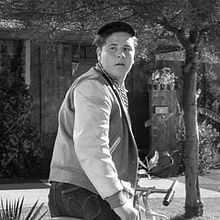Lumpy Rutherford
| Clarence "Lumpy" Rutherford | |
|---|---|
 Frank Bank in his debut episode "Lumpy Rutherford". | |
| First appearance | "Lumpy Rutherford" (January 24, 1958) |
| Last appearance | "The All-Night Party" (May 30, 1963) |
| Created by |
Joe Connelly Bob Mosher |
| Portrayed by | Frank Bank |
| Information | |
| Gender | Male |
| Family |
Fred Rutherford (father) Gwendolyn Rutherford (mother) Unknown (brother) Violet Rutherford (younger sister) |
Clarence "Lumpy" Rutherford is a fictional character in the television sitcom Leave It to Beaver. The show aired from October 4, 1957 to June 20, 1963. Lumpy is a bit of a bully and, with Eddie Haskell, is one of Wally Cleaver's friends.
Lumpy was portrayed in the original series by Frank Bank. The actor also appeared as Lumpy in the sequel series, The New Leave It to Beaver (1985–1989). "Lumpy" was portrayed by Justin Restivo in the 1997 spin-off film, Leave It to Beaver, also his portrayer Frank Bank made an appearance in the film as "Frank".
Overview
Lumpy is introduced to the viewer in the first season episode "Lumpy Rutherford". He's the 16-year-old son of Fred (Ward Cleaver's co-worker). The Rutherfords live somewhere in the Cleaver neighborhood, which gives Lumpy the opportunity to bully the Cleaver boys on their way home from school. The boys plot Lumpy's comeuppance but the plot backfires when Fred accidentally steps into the trap. Although a touch of the bully never leaves Lumpy, he eventually becomes Wally's friend. They are in the same class together at school, in spite of a three-year age spread between the two.
Lumpy is a papa's boy. He is well known for referring to his father as "Daddy". Fred would tell Clarence he was too old and big (usually referring to his "lumpiness") to call him "Daddy". A running gag on the show was to have Fred, who always referred to his son as Clarence, call him "Lumpy" when angry. Fred would also call Lumpy a "big boob" or a "big oaf." Lumpy's mother Gwendolyn ("Geraldine", in some early episodes) and his younger sister, Violet (who is about Beaver's age), round out the family. Violet gives Beaver a black eye in an early episode. Lumpy also has an unseen brother.
Lumpy is not the brightest fellow in Mayfield. He is a very hefty young lad and is often teased because of it. Lumpy often persuades others to do things that he is really too afraid to do himself. He sometimes picks on Beaver. Beaver responds by yelling at Lumpy from a distance "Lumpy Dumpy looks like an ape." Several references are made that Lumpy plays the clarinet, and later plays the tuba.
When Lumpy wins a college football scholarship in a later episode, June Cleaver throws a party and bakes a cake in the shape of a football field. In another episode, Wally and Eddie Haskell play a prank on Lumpy that involves the rear axle of his car being removed with a chain.
The New Leave It to Beaver
Lumpy and Beaver form a successful business partnership (the "Cleaver and Rutherford Co."). As with their fathers, it is never specified exactly what the scope of the business is. Previously, both men had worked for Fred Rutherford's company (until Fred's death).
Lumpy is married and has a daughter, J.J.
References
- Applebaum, Irwyn. The World According to Beaver. TV Books, 1984, 1998. (ISBN 1575000520).
- Bank, Frank. Call Me Lumpy: my Leave It To Beaver days and other wild Hollywood life . Addax, 2002. (ISBN 1886110298), (ISBN 978-1886110298).
- Brooks, Tim and Earl Marsh, "The Complete Directory to Prime Time Network and Cable TV Shows, 9th Ed." Ballantine Books, Random House, New York City, New York, 2007. (ISBN 0-34549-773-2).
- Colella, Jennifer. The Leave It to Beaver Guide to Life: wholesome wisdom from the Cleavers! Running Press, 2006. (ISBN 0762427736), (ISBN 9780762427734).
- Leave It to Beaver: the complete first season. Universal Studios, 2005.
- Leave It to Beaver: the complete second season. Universal Studios, 2006. (ISBN 1417074876)
- Mathers, Jerry. ...And Jerry Mather as "The Beaver". Berkley Boulevard Books, 1998. (ISBN 0425163709)
- Terrace, Vincent, "Television Character and Story Facts: Over 110,000 Details From 1,008 Shows, 1945-1992," McFarland & Co. Inc., Jefferson, North Carolina, 1993. (ISBN 0-89950-891-X).
External links
| ||||||||||||||||||||||||||